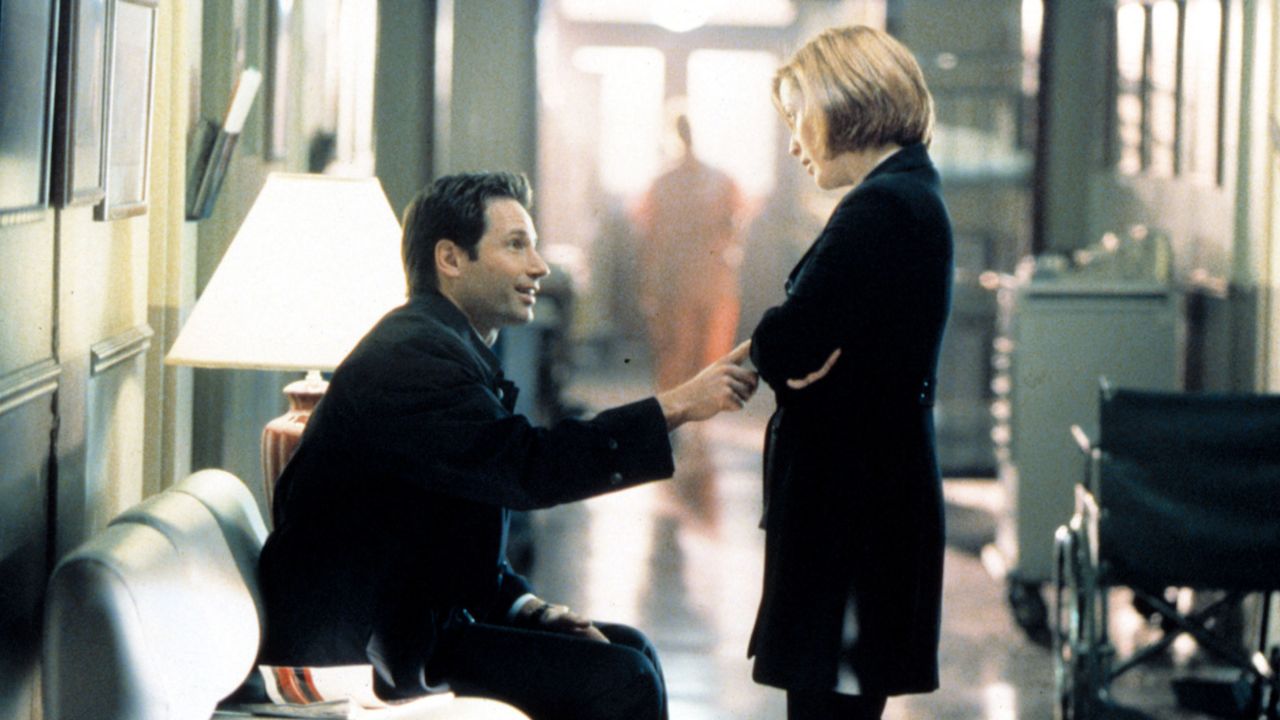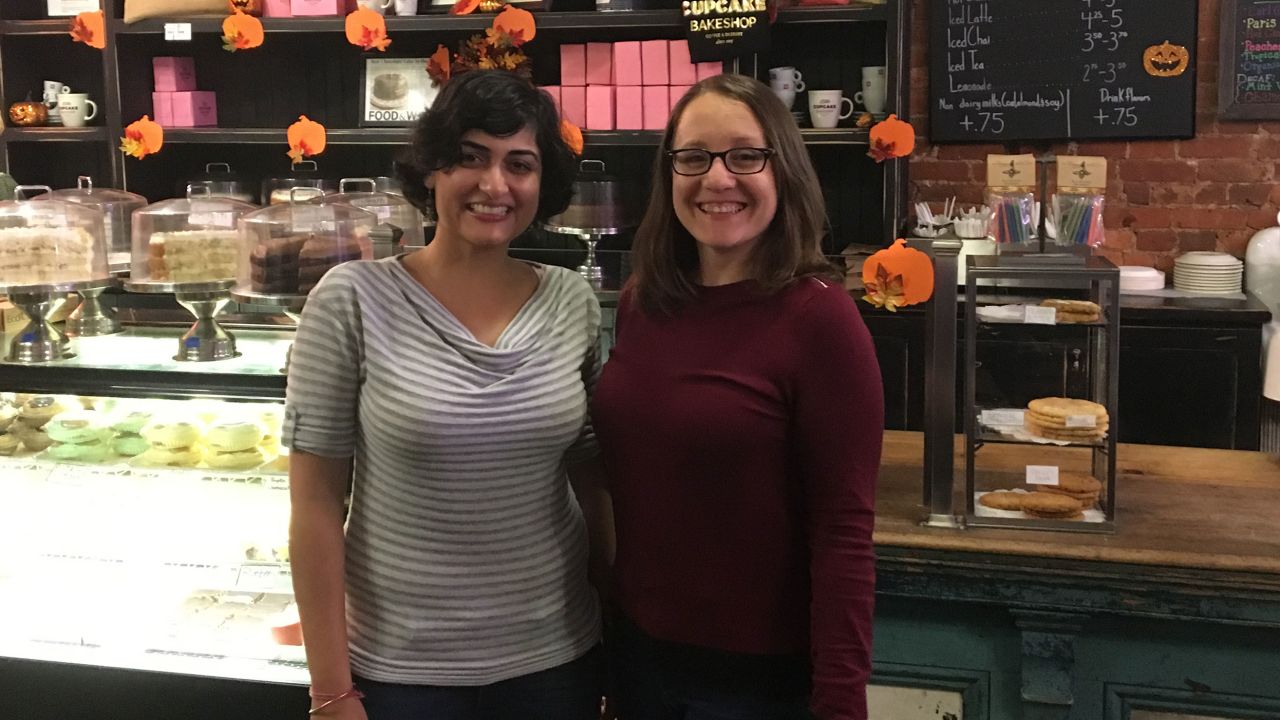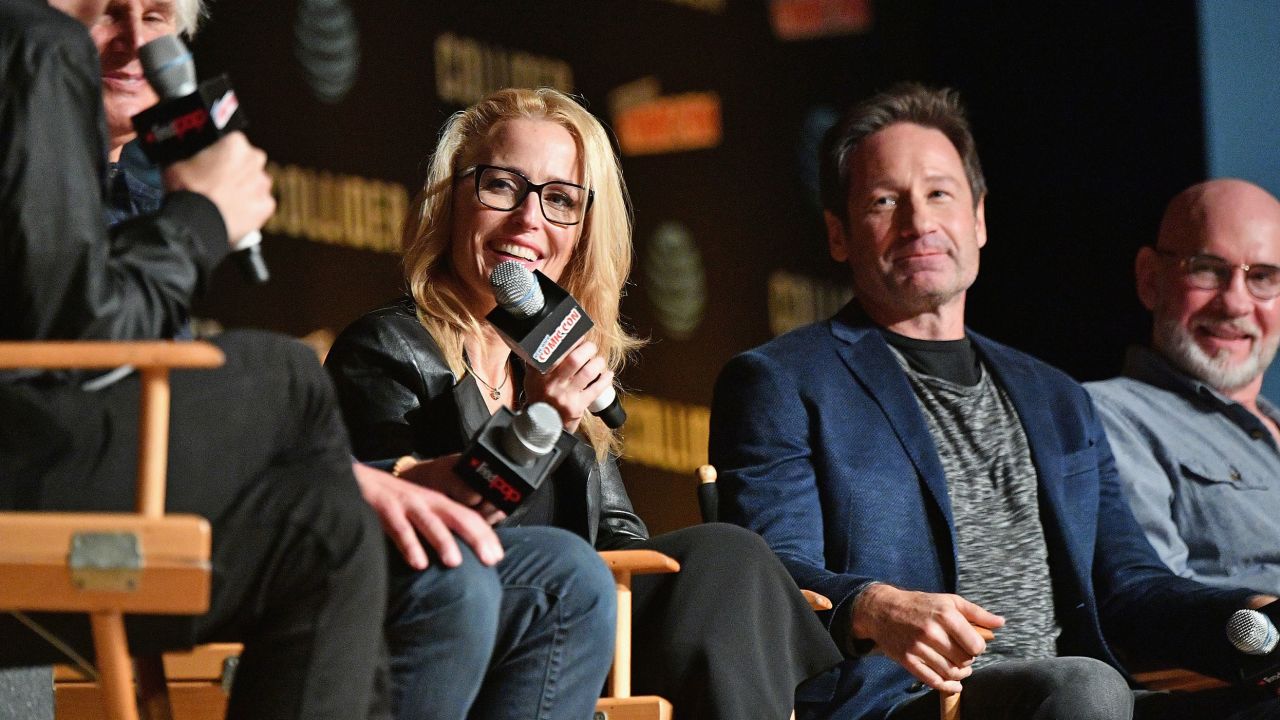Thirty years ago, on a Friday night in September, a sleepy and modestly budgeted show about a pair of FBI agents investigating the paranormal debuted on a very young Fox network. It wasn’t exactly a formula for ratings success. But “The X-Files” was destined for a higher path.
Starring David Duchovny and Gillian Anderson at the beginning of their careers, the show eventually moved to a Sunday night primetime slot, invading pockets of pop culture as its viewership and budget grew. The series became the subject of a “Simpsons” crossover, while The Barenaked Ladies’ song “One Week” shouted out the ever-ominous villain Cigarette Smoking Man. “The X-Files: Fight the Future” hit theaters in 1998 in the middle of the show’s nine-season original run before a second movie (2008) and two revival seasons (in 2016 and 2018) followed.
What began as a cult favorite became so ubiquitous that the series — along with the iconic duo of Fox Mulder (Duchovny) and Dana Scully (Anderson) — became household names to fans and non-viewers alike. The lead pair’s will-they-won’t-they chemistry and the debate surrounding their relationship changed the language used by fandoms.
“The term ‘X-Files’ itself… I feel like that’s become a ‘beam me up, Scotty’ or ‘set phasers to stun,’” said Paul Booth, a professor of media and pop culture at Chicago’s DePaul College of Communication who specializes in fan studies. “It’s just become part of the pop culture zeitgeist that you refer to secret documents as X-Files.”
The show’s peak popularity in the mid-to-late ‘90s coincided with the proliferating use of the internet, where fans, self-proclaimed X-Philes, gathered to debate theories and behind-the-scenes gossip, while posting fanfiction, fan art and more. I, myself, am a Phile who watched the entire series, posted to messageboards and dabbled in fanfiction as a teen, eventually co-writing a rewatch blog as an adult. In short, I had a front-row seat to the way “The X-Files” shaped internet culture, fandoms, broader pop culture — and even people’s lives. That impact can still be felt today.
Why ‘The X-Files’ spoke to its audience
“The X-Files” largely revolved around FBI agents Mulder and Scully, assigned to the bureau’s … you guessed it, X-Files, the name for unsolved cases involving paranormal activity. The plot alternated between the investigation of aliens and UFOs — the core of what became the series’ ongoing mythology — as well as assorted creatures and mysteries at the center of what are known as “Monster of the Week” episodes.

With Mulder positioned as the believer and Scully as the skeptic, audiences were treated to compelling character dynamics — including questions about the nature of their relationship — in addition to conspiracy-laden and often-spooky storylines.
“It was the last decade of the 20th century, so you have that whole fin-de-siècle end-of-the-century malaise… or uncertainty,” said Don Presnell, a senior lecturer at University College at Appalachian State University in Boone, North Carolina, who feels much of the show’s appeal was linked to the timing of its original run. (Presnell taught an ”X-Files”-themed First Year Seminar course during the 2022-2023 academic year.)
Presnell also attributes the show’s allure to qualities it shared with TV predecessors like “The Twilight Zone” and “Kolchak: The Night Stalker,” and films like “All the President’s Men,” as well as its ability to span genres — “The X-Files” boasts a number of well-regarded comedic episodes in addition to one episode so disturbing, it was banned from network TV.
“The depth of character development was great,” said Anne Harriss of North Carolina, an X-Phile I befriended on Fox’s official messageboards for the series in the early aughts. “The struggle between faith and fact, belief and science was always there. The humor could be silly and over the top, but usually ended with a profound glimpse into humanity at its best and worst.”
Many of the show’s fans flocked to the fledgling internet — some, like Harriss, lurked online at their offices before splurging on personal computers, powering through dial-up connections to congregate on messageboards and in chatrooms. “X-Files” fan sites, often full of black backgrounds and green text along with scattered MIDI files blasting the show’s theme song, grew in number as the ‘90s progressed.
“The subject matter of ‘The X-Files’ matches really well with online discussion. The show is all about conspiracies and mysteries and uncovering the truth,” said Booth, nodding to the show’s tagline, “The truth is out there,” while also noting that it mastered telling standalone stories combined with an “ongoing mystery” in a way that compelled viewers to go online and exchange theories.
And then, of course, there was the Mulder and Scully relationship.
How X-Philes formed their own lexicon and contributed to internet culture
Talk to an X-Phile today and you’ll still get an array of opinions over Mulder and Scully’s relationship, which began as a friendship with elements of “UST” — unresolved sexual tension, as fan sites called it — and culminated in romance, in a way only “The X-Files” could portray one, after many seasons.
Fans were largely divided into two camps: Relationshippers — eventually shortened to “shippers” — who clung to every long look or feisty exchange between Mulder and Scully as evidence of the pair’s undying love for one another. The anti-romance crowd, or “noromos,” preferred focusing on alien conspiracies and monsters — or simply making fun of shippers.
“I couldn’t stand that shipper stuff,” said Presnell. “That’s not what the show was about.”
But there’s no denying how much the online discourse revolved around the Mulder/Scully pairing, whether it involved shippers and noromos good-naturedly (or in all seriousness) “flaming” each other in online forums, or Mulder/Scully fanfiction, or fan videos set to schmaltzy love songs. “The X-Files” was not the first or last show to get viewers invested in the relationship of fictional leads, but the term “shipper” moved beyond online Philes’ inner circle and began to be used by fans of everything from “Buffy the Vampire Slayer” to the “Harry Potter” series. It’s now a commonly used word in fan culture and recognized by multiple dictionaries.

“Whenever I see people online using the word ‘shippers’ or ‘shipping this couple or that couple,’ I feel a sense of pride,” said Eileen Pereira of Nevada, another one of my “X-Files” messageboard friends. “I know I’m not the creator of these chat phrases and words, but I was part of the group that helped to initiate it into the online lexicon.”
“I’ll see it in print and think, ‘Yup, we did that. We started that.’”
Philes also helped build online fandom and internet culture in other ways — “The X-Files” fanfiction wasn’t a unique contribution in the way a term like “shipper” was, but online archives like “The Gossamer Project,” which describes itself as “(containing) the vast majority of X-Files fanfiction on the Internet,” as well as fan submissions to Fanfiction.net and postings on other sites, helped bring that genre of writing to a new level of popularity by the late ‘90s.
Booth said that versions of what one would consider fanfiction can arguably be traced back to the 1700s, while “people have been writing fanfiction formally since the ‘50s.”
But series like “The X-Files,” “Buffy” and “Star Trek: Voyager” — and the resulting fanfiction posted to the then still-new internet — did transform fanfiction into “something people would admit to writing,” he said. “‘The X-Files’ absolutely contributed to that in a huge way.”
How X-Philes created a lasting community
As their own vocabulary and online communities formed, X-Philes have built friendships that they maintained on and offline. It’s how I’m still in touch with Pereira and Harriss, as well as Rhiannon Hope of Australia — another “X-Files” messageboard friend — whom I met offline during her 2019 visit to the US.
While recalling dabbling in “X-Files”-themed graphic design and fanfiction, and expressing how “glad” she is the latter can’t be found anywhere now, Hope pointed out that more than 20 years have passed since we all met online.
“There is some profoundness there in it, that there are these people you can connect with. That it’s only until very recently that we got to see each other in person” she told me in a recent Zoom conversation. “There’s that friendship — it’s there and it was literally the entire time through words on a screen.”

For Pereira and Harriss, longtime fans of earlier geeky fare like “Star Trek,” “The X-Files” brought them a new way to meet more like-minded enthusiasts.
“The most common way to interact with fans before the internet was at conventions,” said Pereira. “But the internet brought that kind of socialization to a whole new level. And ‘The X-Files’ was definitely at the forefront of this new way. No matter what time of the day it was, you were bound to find someone to talk to on that messageboard.”
Many have stayed in touch via social media over the years, while also meeting in person. (Pereira herself has had many in-person meetups with fellow “Wenches,” a group of women devoted to the character of Assistant Director Walter Skinner, played by Mitch Pileggi — one Wench was even the maid of honor at her wedding.)
“As an older member of the core group, I’ve watched my internet ‘kids’ grow up, go to college, first jobs, marriage, successful careers, babies… it is wonderful,” Harriss said. “Internet friends are just as legitimate as friends you meet in (real life). Sometimes more so.”
‘The X-Files’ is still out there
Amid talk of an “X-Files” reboot, the original show’s presence on streaming platforms and continued pop culture references and tributes (Japanese Breakfast’s “Be Sweet” video is just one example), “The X-Files” is far from forgotten. Many elements of the show’s storytelling devices — especially its use of a serialized narrative — are reflected in today’s TV writing. And it helped set a “template for encouraging fan discussion,” Booth said.
“They encouraged fandom, they created a messageboard, they wanted people to be talking about the show,” said Booth. “I think that style of fan engagement is what we see today. I think we can attribute a lot of that to ‘The X-Files,’ that understanding that fans are not a group of people to try to avoid or eschew — but a group of people you want to cultivate and you want to be on your side.”

Nothing can replicate the magic of those early messageboards for a particular group of Philes like myself, but we feel the impact of that time. Hope and I reminisced about building websites and experimenting with graphic design, which we may not have done without “The X-Files” or the internet preoccupying our younger selves. Ironically, those skills remain relevant to our jobs and personal lives today.
Pereira credits her experiences with the internet during that period with shaping future online interactions, including those with her now husband, whom she met on a forum for classic movie fans.
“Being on ‘The X-Files’ forum helped me to interact and learn to trust him before meeting him… and eventually falling in love and marrying him,” she told me.
Harriss feels a lot of the language used online today came directly from those “X-Files” boards, calling it “the mother tongue as it were.”
“It was all new and exciting,” she said of those days. “I hope to be in on the next big thing.”
Article From & Read More ( Ever ‘shipped’ anyone? You can thank ‘The X-Files’ for that - CNN )https://ift.tt/ykFLlst
Entertainment
Bagikan Berita Ini














0 Response to "Ever ‘shipped’ anyone? You can thank ‘The X-Files’ for that - CNN"
Post a Comment